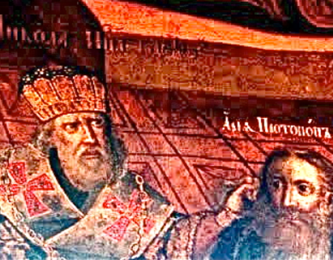Do You Believe Sinterklaas (Saint Nicholas)?
02-06-2025 - Posted by Geert-JanOriginally posted on December 02, 2025 - by Andre Piet
Every year in our country (the Netherlands), there’s a lot of commotion about Zwarte Piet (Black Pete). It is said to be a racist stereotype. Recently, I heard that somewhere in our country, a man from Central Africa was refused to dress up as ‘Piet’ because he was too black… But enough about that, because in this blog, I want to talk about Sinterklaas (Saint Nicholas), ’the good holy man’. Did you know that this Nicholas of Myra, about 1700 years ago (in 325 AD), was delegated to the Council of Nicaea? And that he fully supported the decisions made there?
The Council of Nicaea
The reason for convening this council, under the leadership of the Roman Emperor Constantine, was the position of a certain Arius from Alexandria, who rejected the idea that Jesus Christ was ‘God the Son’, as his opponent Athanasius claimed. The Council of Nicaea, however, almost unanimously sided with Athanasius and condemned Arius as a heretic. Tradition tells that the bishop of Myra (yes, Sinterklaas) on that occasion slapped Arius in the face (see image). In any case, it is this council that forms the basis of all Christian orthodoxy. Here, the doctrine of the Trinity was officially accepted by the Christian church, and Arius was condemned as a heretic.
Departed from the Sound Words
The Council of Nicaea adopted formulas such as ‘one essence, three persons’, ‘God the Son’, and ‘Trinity’. With this, it formally departed from “the sound words” of Scripture. Dozens of times, Scripture speaks of “God the Father”, but we never read about ‘God the Son’. It is entirely justified that Arius protested against this. Jesus Christ can also not possibly be ‘God the Son’, because Scripture repeatedly declares: “there is one God, the Father” (1 Cor. 8:6; Eph. 4:6; John 17:3). And the Son is “the image of the invisible God” (Col. 1:15). God’s Icon.
‘Who Does Not Believe in the Trinity Cannot Be Saved’
The council in which Saint Nicholas participated with conviction anathematizes those who adhere to the words of Scripture. As stated at the beginning of ’the Athanasian Creed’:
- Whoever wants to be saved must, above all, hold the Catholic faith.
- Whoever does not keep it whole and undefiled will doubtless perish eternally.
- The Catholic faith is this: that we worship one God in Trinity and Trinity in Unity…
And the document ends with this declaration:
- This is the Catholic faith; whoever does not believe it faithfully and firmly cannot be saved.
If you are a member of an orthodox church (Roman Catholic, Greek Orthodox, Calvinist, Lutheran, Baptist, Charismatic, Pentecostal, etc.), then you should know that the above words are part of the creed of that church. No matter how kindly they approach you, if you do not confess the Trinity, you are, in their eyes, not a Christian and are destined for ‘hell’.
Disguised Polytheism
The Council of Nicaea definitively confirmed the departure that the early church had already taken from the Gospel as Paul had preached it among the nations. Officially, they distanced themselves from the monotheism of Scripture. “One God, the Father” was a completely self-evident truth for the Jewish writers of the New Testament. But in a few centuries, pagan influences distorted it into ‘Trinity’. It is disguised polytheism. They worship three persons.
Easter Date Disconnected from Passover
The Council of Nicaea also settled another issue, and both decisions are indicative of the course that was set at that time. Nicaea also regulated the determination of the Easter date. Nicaea decided that Easter should be celebrated on the first Sunday in spring, after the full moon. Easter was thereby disconnected from (the Jewish) Passover. So much so that if Easter happened to coincide with Passover (which occasionally happens), then Easter must be postponed by a week. To this day, this is the way the Easter date is determined. Isn’t that shocking?! Jesus Christ died and rose during Passover, but Nicaea issued the decree that Easter was to have nothing to do with it.
Officially Derailed
The Council of Nicaea is one of the darkest pages in church history. Here, the Christian church officially derailed, and since then, all (!) of orthodoxy continues on this path. All pointing to eternal hell for those who do not believe in the doctrine of the Trinity… Just so you know.
You who read this surely no longer believe in Sinterklaas. But a much more important question remains: do you believe Sinterklaas?

 English Blog
English Blog